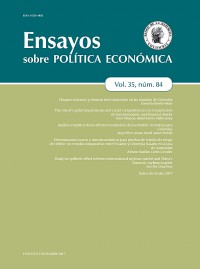Uncertainty Spillover and Policy Reactions

Spells of uncertainty are argued to cause rapid drops in economic activity. Wait and see behavior and risk aversion in combination with other frictions can make periods of increased uncertainty an important driver of the business cycle. Emerging economies may endure even stronger and prolonged recessions following a global uncertainty shock, as credit constraints in shallow financial markets limit smoothing. Active policy responses often exacerbate the cycle. The present study uses a novel proxy of uncertainty – inspired on Jurado et al. (2015) – in which I extract a common factor that is not driven by the business cycle from a broad set of forecast indicators. I then estimate an interacted panel VAR on a large set of developed and emerging economies over the period 1990Q1-2014Q3 to test responses to shocks to uncertainty. Emerging markets suffer a larger fall in consumption and investment as uncertainty spreads globally. The main finding is that more developed financial markets are key to dampen the transmission of the shock. Fiscal policy is an alternative, but only if there is sufficient fiscal space to smooth shocks. Monetary policy dampens the effects of uncertainty under a fixed peg better than in a floating exchange rate regime.



